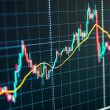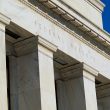Memo to: Oaktree Clients
From: Howard Marks
Re: On the Couch
I woke up early on Saturday, December 12 – the morning after a day of significant declines in stocks, credit and crude oil – with enough thoughts going through my mind to keep me from going back to sleep Thus I moved to my desk to start a memo that would pull them together I knew it might be a long time between inception and eventual issuance, since every time I dealt with one thought, two more popped into my head In the end, it took a month to get it done.
Professor Richard Thaler of the University of Chicago is a leading expert on behavioral economics and decision-making (in fact, he’s such a significant figure in the field that he was given a cameo role in the movie The Big Short) He opens his new book, Misbehaving, with Vilfredo Pareto’s assertion that “the foundation of political economy and, in general, of every social science, is evidently psychology.” I’d apply that equally to the not-so-scientific field of investing.
It has been one of my constant refrains – dating back all the way to “Random Thoughts on the Identification of Investment Opportunities” (January 1994) – that in order to be successful, an investor has to understand not just finance, accounting and economics, but also psychologyA thorough understanding of how investors’ minds work is essential if one is to figure out where a market is in its cycle, why, and what to do about it For me, the markets’ recent behavior – certainly on December 11, but also at other points in 2015 – reinforces that observation.
This memo is my attempt to send the markets to the psychiatrist’s couch, and an exploration of what might be learned there.
2012-14: An Uncertain World
In September 2012, I wrote a memo called “On Uncertain Ground.” To begin it, I observed that “The world seems more uncertain today than at any other time in my life.” I went on to list the things that worried me Few of them are less troubling today Certainly the period of the post-crisis recovery hasn’t been carefree Here are the things that concerned me in 2012, as viewed from that perspective:
• Macro growth – It seems to be broadly accepted that overall economic growth will be slower in the years ahead than in the latter part of the twentieth century Do lower birth rates and slowing gains in productivity doom us to reduced macro gains? What does this mean for everything else? In particular, if growth remains slow, will it lead to slowing inflation, or even deflation?
• Trends in the developed world – Will the developed nations be able to compete in a globalized economy? How will incomes hold up as developing nations produce goods cheaper, and as the quality of those goods improves? As we increasingly become knowledge-based economies, will we need as many less-educated workers as in the past? If not, what will be the ramifications for unemployment, income inequality and society as a whole?
• Consumer behavior – Will consumers regain the confidence required to return to their expansive spending behavior? Will they employ credit as in the past to perpetuate growth in consumption?
• Europe – Will Europe move forward in terms of cohesion, coordination and productivity? What happens if it doesn’t? Will the ECB be able to engineer an economic recovery? Will the departure from the European Union of Greece – or new Greeces – return as a worry in the future? (And now, will the coming referendum mandate Great Britain’s departure? Will there be a new referendum in Scotland with regard to remaining in the UK? Will Catalonia vote to leave Spain, and what will that mean for its membership in the EU?)
• Leadership – For years I gave speeches using PowerPoint slides listing sources of uncertainty, but where it was supposed to say “dearth of leadership,” someone had mistakenly typed “death of leadership” and nobody quibbledThroughout the world, few countries if any have leaders on par with history’s best Certainly that’s true in the U.S You may think it’s a good thing, or you may not, but it’s clear that Washington is too gridlocked to accomplish muchAs I wrote in “On Uncertain Ground,” “U.Spoliticians seem to value things like ‘ideological purity’ (i.e., toeing the party line) and being reelected above real attempts at problem solving Partisanship and open warfare has surely reached a new zenith.”
• Entitlements – Social Security is a locomotive rumbling down the track to ruin The cost of health care programs is growing rapidly, as drugs become more expensive and Americans live longer Defined-benefit pensions have been promised to public employees but not fully funded How will federal, state and city governments meet their obligations? Not only does no one know, but also few people in government (certainly not in Washington) seem to care.
• China – As the world’s second-largest economy, China plays a very important role in determining global growthIts GDP advanced at double-digit rates over the last 20+ years – without recessions – on the basis of (a) millions of people moving from farms to cities (and to more productive roles in manufacturing), (b) the low-cost exports they produced and (c) readily available capital and the heavy fixed-asset investment it permitted Henceforth China will gain less from the above and will have to transition to domestic consumption of goods and services, as well as a slower-growing economy perhaps with ups and downs like the rest of the world Will this result in a near-term hard landing? And what will be the impact on nations that sell commodities and finished goods to China?
• Geopolitical hotspots – From the fall of the Soviet Union at the end of 1991 until the 9/11 attacks in 2001, investors’ positive feelings were abetted by the presence of peace in the world But in recent years we have faced challenges involving Iran, Israel and the rest of the Middle East; Russia and Ukraine; China and North Korea; and terrorist threats in many places How will markets react to the inevitable flare-ups?
The worries listed above confronted investors throughout the period 2012 through 2014 And in the last few months of that period, we saw a halving of the price of oil; additional slowing in China; worsening news from the Middle East; and continuing uncertainty regarding the Fed’s likely action on interest rates.
Given markets’ abhorrence of uncertainty, we normally would expect such issues to result in low asset prices and negative returnsBut in 2012-14, despite the many negatives, we saw a cumulative return of 74% on the S&P 500, as well as strong appreciation on the part of real estate and companies that had been the subject of buyouts Further reflecting investor confidence, the yield spread versus Treasurys for the average U.Shigh yield bond narrowed from 706 basis points at the end of 2011 to 522 b.pat the end of 2014, at which point the prospective yield to worst was down to 6.67% Thus, as 2014 moved to a close, we saw: the litany of meaningful macro risks described above,
• investors engaging in pro-risk behavior in pursuit of adequate returns in a low-return world,
• as a consequence, full asset prices, and thus
• little likelihood of achieving returns high enough to compensate for the risks.
To sum up, psychology (and thus prices) were high given the fundamentals Our world was marked by low prospective returns and plentiful problems, a troubling combination.
Here’s what I wrote in “Risk Revisited” in September 2014:
While investor behavior hasn’t sunk to the depths seen just before the crisis (and, in my opinion, that contributed greatly to it), in many ways it has entered the zone of
imprudence.
It’s the job of investors to strike a proper balance between offense and defense, and between worrying about losing money and worrying about missing opportunity Today I feel it’s important to pay more attention to loss prevention than to the pursuit of gain For the last three years Oaktree’s mantra has been “move forward, but with caution.” At this time, in reiterating that mantra, I would increase the emphasis on those last three words: “but with caution”.
Although I have no idea what could make the day of reckoning come sooner rather than later, I don’t think it’s too early to take today’s carefree market conditions into consideration What I do know is that those conditions are creating a degree of risk for which there is no commensurate risk premium.
[Download the complete 16 page memo]
Copyright © Oaktree Capital












